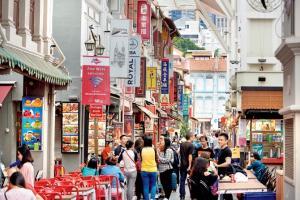How Singapore, roughly the size of Mumbai, with less than a third of its population, paves the way for manageable living

The inter-generational locals of Singapore comprise Chinese, Malay and Indians, who share this space with migrant professionals from across the world. Pic/Getty Images
 It's rare to hear your three favourite drunk-type, desi dance songs – Gulaabo, Senorita, Humma Humma – nearly back-to-back, as firang women, in exotic lehengas, lip-sync to it, almost word for word, pulling in guests (an equal mix of women and men) to the dance-floor, over a night that carries on until morning.
It's rare to hear your three favourite drunk-type, desi dance songs – Gulaabo, Senorita, Humma Humma – nearly back-to-back, as firang women, in exotic lehengas, lip-sync to it, almost word for word, pulling in guests (an equal mix of women and men) to the dance-floor, over a night that carries on until morning.
ADVERTISEMENT
This, of course, could not happen in Mumbai. For one, the legit dance bar, such as the one we were at (Moshi Moshi in Singapore), doesn't exist in the city of its origin. Either way, cops would have swooped in to harass owners and customers, if a drinking-dancing place remained open until late anyway, because folk in Mumbai, according to the state, aren't entitled to too much fun.
Singapore is supposedly a totalitarian state. In fact, the first thing you notice about it is the near absence of cops. There are hardly any at the airport. None whatsoever on the streets. This can be simultaneously reassuring and frightening.
No one, for instance, would ever risk casually trying marijuana, in their lifetime, on this soil - forget stronger substances. Someone I know instantly sprinted out for his life, at a far-out mansion, the second he vaguely suspected there could be a doobie doing the rounds inside. Penalty for marijuana possession is capital punishment.
The complete lack of cops also signifies you're being constantly watched anyway - every single inch of Singapore, I'm told, is visually mapped, covered, under round-the-clock surveillance cameras. There is no question of a harasser prowling in this sprawling metropolis, and getting away with it.
This isn't so hard to do in a city that's roughly the size of Mumbai, with less than a third of its population; but imagined along the lines of a full-on country - like Monaco, or Vatican, currently; or roughly, Rome, Athens, Carthage, from the ancient past.
One can incessantly debate the historical definition of a city-state. What's undeniable is that while you're really in a sovereign nation of its own, it rarely ever takes more than 15 minutes to get from anywhere, to anywhere, in Singapore. This is about as much time I spend crossing the road in Maharashtra's Mumbai.
You can zip during rush-hour, since most people choose not to bring their cars on the road. Owning one is progressively discouraged by the state that imposes crazy taxes to make them prohibitively expensive. My friend Sweta, who moved to Singapore from Mumbai eight years ago, tells me a goddamn Suzuki Swift costs R25 lakh! Of course this is done bearing in mind the quality and ease of an equally comfortable public-transport system in place.
Residents (most of them migrants I met) say this frees up a quarter of a day in their life to do stuff outside of work - live, basically. But, work hard, they must. It's deeply ingrained in the local culture. Never mind annual anniversaries, even on his death, Singapore's patriarch Lee Kuan Yew insisted that there is no public holiday.
Having served Singapore (in various capacities) for 60 years, Yew, 91, passed away on March 25, 2015. Everyone took a brief break from work that day, Sweta recalls, joined the funeral march, and quietly went back to their desks.
This is an expensive city. There is low sense of entitlement. Once the working person retires, Sweta says, the government releases social-security provident-fund (PF) in instalments, like monthly salaries. Once the person dies, the remaining PF gets transferred to the legal heir's similarly-designed retirement kitty. Singapore currently draws the highest per capita income in Asia (barring Japan).
And, to think of it, Malaysia, its big neighbour, had no interest in Singapore, when it got founded as an independent state, as late as 1965. They saw no potential in this apparently useless piece of land at the mouth of a small river.
The inter-generational locals of Singapore essentially comprise Chinese, Malay and Indians, who share this space with migrant professionals from across the world-gracefully adding to the number of fervent religious celebrations, even national holidays on that account.
There is zero-tolerance on racism. A cabbie once called my friend, a "bloody Indian" (kindergarten-speak by India's Twitter standards of daily slur). He was instantly suspended from the taxi company. Despite a penchant for neat design and orderliness, Singapore also has a thoroughly relaxed underground scene. I realised this for the first time, walking into bars that could pass off as apartments, with the ring of the door-bell that allows you in.
No, this isn't a real-estate ad. Or call for work-permit visas! I'm just saying, what if we carved out small territories from scratch, as against continuing with huge, unwieldy nation states, with hawks all over (at the top), eyeing its vast natural, and public resources. Would Solapur technically bear the same potential as Singa? I think so.
Mayank Shekhar attempts to make sense of mass culture. He tweets @mayankw14 Send your feedback to mailbag@mid-day.com
Catch up on all the latest Mumbai news, crime news, current affairs, and also a complete guide on Mumbai from food to things to do and events across the city here. Also download the new mid-day Android and iOS apps to get latest updates
 Subscribe today by clicking the link and stay updated with the latest news!" Click here!
Subscribe today by clicking the link and stay updated with the latest news!" Click here!






